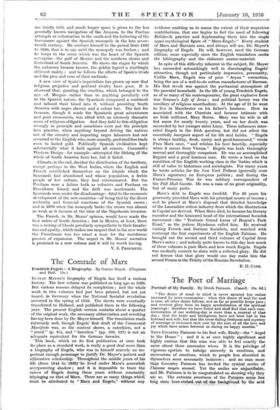The Comrade of Marx
Friedrich Engels : A Biography. By Gustav Mayer. (Chapman and Hall. 15s.) GusTAV MAYER'S biography of Engels has itself a curious history. The first volume was published as long ago as 1920. But various reasons delayed its completion ; and the whole work in two volumes had just been printed, but not yet issued, in Germany when the National Socialist revolution occurred in the spring of 1933. The sheets were eventually transferred to Holland, and published there in the follOwing Yelp.. The present English version contains about a quarter. Of the original work, the necessary abbreviation and rewriting hiiving been done by Dr. Mayer himself. The translation reads Extremely well, though Engels' first draft of the Communist Manifesto was, as the context shows, a catechism, not a " creed " (p. 85), and " harmless " (pp. 100, 127) is not an adequate equivalent for the German harmbls. - —This book, which on its first' publication at once took its place as a standard work, is really a good deal more than a biography of Engels, who' was in himself scarcely an im'- portant enough personage to jUstify Dr: Mayer's patient and uiustive schoLirshiri. Thrall-06U the middle years of his' life -(from 1844 'lb '113813)The lived under Marx's somewhit overpowering shadow ; and it is impossible to trace the career of Engels during these years without constantly ilia-pinging on that_of, Marx.. There are so many things_which must be attributed. to " Marx anci. Engels,'-'. without - any-
_ . evidence enabling us to assess the extent of their respective contributions, that one begins to feel the need of following Bolshevik practice and hyphenating them into the single quasi-mythological figure of " Marx-Engels." Every student of. Marx and Marxism uses, and always will use, Dr. Mayer's biography of Engels. He will, however, need the German edition, more especially since the English translation omits the bibliography and the elaborate source-material.
In spite of this difficulty inherent in the subject, Dr. Mayer has succeeded astonishingly well in disentangling Engels' attractive, though not particularly impressive, personality.
Unlike Marx, Engels was of pure " Aryan " extraction, being the son of a well-to-do cotton manufacturer of Barmen.
His first revolt was against the puritanical atmosphere of the parental household. In the life of young Friedrich Engels, as of so many of his contemporaries, the great explosive force
was Strauss's Life of Jesus ; and political heresy was the corollary of religious unorthodoxy. At the age of 21 he went to live in Manchester on his father's business. Here he associated with the Chartists and became intimate with an Irish millhand, Mary Burns. Mary was his wife in all but name for nearly twenty years, and on her death was succeeded by her younger sister Lizzy. These influences inter- ested Engels in the Irish question, but did not affect the essentially bourgeois aspect of his life and habits. " Engels is always healthy, fresh, merry and good-humoured," wrote Frau Marx once, " and relishes his beer heartily, especially when it comes from Vienna." Engels was both thoroughly normal and thoroughly competent. He was an accomplished linguist and a good business man. He wrote a book on the condition of the English working class in the 'forties which is still of value to historians and sociologists. For many years he wrote articles for the New York Tribune (generally over Marx's signature) on European politics ; and during the Franco-Prussian War he was military correspondent of the Pall Mall Gazette. lie was a man of no great originality, but of many parts.
Marx's debt to Engels was twofold. For 30 years his generosity provided Marx with his principal source of income ; and he placed at Marx's disposal that detailed knowledge of the Lancashire cotton industry from which the illustrations in Capital are derived. When Marx died, he became his literary executor and the honoured head of the international Socialist movement—the " Teutonic Grand Lama of Regent's Park Road," as the jealous Hyndman called him. He received visiting French and German Socialists, and watched with contempt the first experiments of the English Fabians. He brought out the second and third volumes of Capital from Marx's notes ; and nobody quite knows to this day how much of these volumes is pure Marx and how much Engels. Engels was modestly content to shine with a reflected glory. He did not foresee that that glory would one day make him the second Person in the Trinity of the Russian Revolution.
E. II. CARR. . -










































 Previous page
Previous page